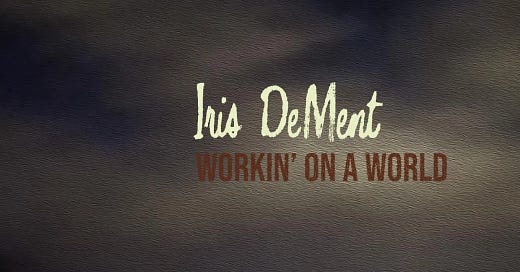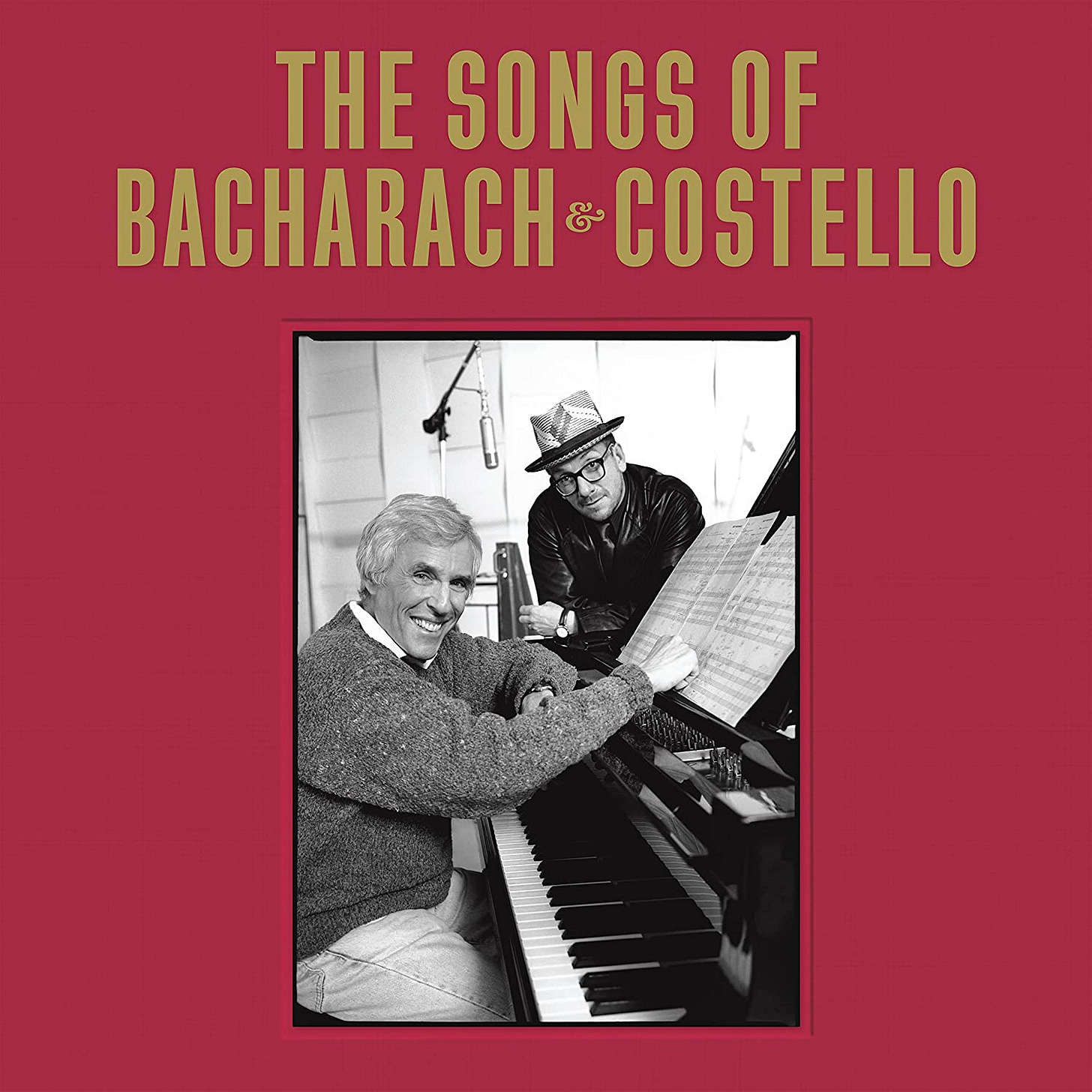Adventures in Listening, March 17, 2023: It's Been a Long Time Coming
Iris DeMent sings the headlines. Van Morrison revisits the sounds of his youth. And, a new Elvis Costello/Burt Bacharach box set.
Iris DeMent - Workin’ on a World
“It’s been a long time coming,” sings Iris DeMent toward the top of her new album, “but I just wanna thank The Chicks.” Students of history might recall the incident DeMent’s referencing— which happened a full six presidential terms ago—when the trio formerly known as the Dixie Chicks offered a relatively mild rebuke to the Iraq War and were subsequently blacklisted from country radio. Here they are invoked as patron saints and canaries in the coal mine, something that tells you two things about Workin’ on a World. One, it tells you that DeMent is following the Chicks’ lead, naming names, decrying injustice, and appraising our sociopolitical malaise with ripped-from-your-liberal-aunt’s-Facebook-feed specificity. And two, it tells you that DeMent’s been bottling up her cultural frustrations for a good while now. Though the Trump administration is undoubtedly in view on “Let Me Be Your Jesus”— a song about evangelicals striking a devil’s bargain with a false messiah— DeMent sounds even more irate when addressing George W. Bush’s rehabilitation from war criminal into gentlemanly painter.
Such topicality is unusual for DeMent, whose earliest and more acclaimed albums (Infamous Angel, My Life) tend to be more domestic in their concerns, focusing less on presidents and more on small-town life, family, and tradition. This is just the fourth album DeMent’s released since Bill Clinton left the White House, including one collection of old Pentecostal hymns and an album-length adaptation of Russian poetry, which points toward something of an open secret: DeMent’s had an acute case of writer’s block, and unleashing some of her grievances about the state of our union turned out to be the thing that reignited her creative spark. The songs on Workin’ on a World are almost entirely concerned with political fracture, a subject that’s occasionally addressed with cynicism but more often with an aspirational tone: DeMent invokes the moral urgency of Dr. King on “The Sacred Now,” extols the valor of John Lewis on “Warriors of Love,” and, on the title song, celebrates the virtue of building a better world for our descendants.
Her topicality is hotwired into traditional forms, including sturdy piano ballads, hearty roots-rock, and the occasional touch of honky tonk. More than once, the album dips back into Pentecostal church music. The friction generated by such in-the-moment songwriting and such old-timey structures is frequently galvanizing, and never more than on “Goin’ Down to Sing in Texas.” Over the course of eight minutes DeMent prowls atop a springy, uptempo blues. It’s not at all dissimilar to something Bob Dylan might have recorded circa Modern Times or Tempest, but where he would have populated his song with old Civil War legends and Groucho Marx routines, DeMent name-drops The Squad, Trump’s Muslim ban, and the Black Lives Matter movement. The song winds up being a kind of mirthless joke: DeMent is initially daunted by the prospect of performing amidst Texas’ lax gun laws, but then realizes there’s not a corner of this country that isn’t angry and violent, so she might as well sing anywhere. It’s not funny funny… but it is funny. (Also, it’s worth playing the song just to hear DeMent’s exaggerated drawl when she pronounces “WMDs,” a reference I am otherwise happy to leave in the archives.)
Yet while I find much to admire about this album, both for the nobility of its intentions and the excellence of its craft, I have to admit that it’s also a bit of a slog. Part of the problem is that it’s just too much: Spending more than an hour marinating in grievances and protests, no matter how artfully or inspirationally they are offered, can be wearying to those of us who already struggle under the constant doomsaying of instant headlines and Internet hand-wringing. That’s less a critique about DeMent’s work, more a caveat emptor.
There’s one other thing. Workin’ on a World is most persuasive and most energizing when DeMent positions her critique within the broader framework of the Christian story. Drawing on the language of her Penetcostalism as well as the faithful witness of the Black church, the best songs on the album urge us to sow seeds of justice, even if we know we won’t live to see them bear fruit. Nowhere is this more evident than on “How Long,” which invokes the Psalms and the Old Testament Prophets by way of MLK; the song reminds us that we can’t change hearts and we can’t always change institutions, but we can reveal the character of God to a world that is at once broken and redeemed. And it grounds our current labors in eschatological hope: We can confidently work for justice because we trust that God will deliver it. Contrast that with the line where DeMent lionizes The Squad for “caring about something that’s bigger than you,” a generalization that has more in common with Occupy Democrats memes than with the Bible’s more specific calls to truth and repentance. These moments crystallize for me something very basic, which is that the Christian story provides the most meaningful framework for understanding the work of justice in the world. More often than not DeMent seems to remember that, and those are the moments when her album actually transcends the culture war, rather than surrendering to its terms.
Van Morrison - Moving on Skiffle
For as long as any of us can remember, Van Morrison has been a curmudgeon— cranky, obstinate, quick to play the victim card, contemptuous of modernity, proudly stuck in the past. Am I being too harsh? Look, I happen to love the guy, and in a lot of ways I think his curmudgeonliness is a feature, not a bug. He’s made some of his most robust, inspired music while stubbornly clinging to the past, paying homage to the traditional forms that he grew up with; since 2000, his two best albums have been the Chicago blues salute Rolling with the Punches and the honky tonk songbook Pay the Devil. It comes as no surprise to find Van the Man equally energized by the bygone sounds of skiffle— a loose, semi-improvised small-group music that was popular on the British Isles in the 1950s, drawing liberally from American folk, blues, gospel, and ragtime. He dabbled in these sounds on a live album called The Skiffle Sessions, released in 2000, but Moving on Skiffle feels like his most heartfelt valentine to the genre, its 23 songs and 90-minute runtime amounting to a generous outpouring of passion. He leads a nimble band through a spirited set of standards, sounding more youthful and energized than he has in years; at its best, the album’s alchemic blend of styles makes me think of Van’s idol, Ray Charles, still unparalleled at this kind of seamless synthesis of forms and idioms. Just one problem: Van’s recent heel turn into a full-on right-wing whiner (recent song titles: “They Own the Media,” “Why Are You on Facebook?,” “Where Have All the Rebels Gone?”) sours his romanticization of the past, curdling fond recollections of youth into golden-age thinking and back-in-the-good-old days conservatism. One song here, called “Guv Don’t Allow,” includes some hamfisted lyrics about the government stifling free expression, its projected martyrdom emanating from Van’s strident anti-mask and anti-lockdown stances. Even if you think Van’s right, the sentiment strikes a decidedly discordant note in what’s otherwise a spritely, joyful collection.
Burt Bacharach and Elvis Costello - The Songs of Bacharach & Costello
There’s a scene in HBO’s Shrinking where a therapist, played by Harrison Ford, counsels his patients to actively engage in the grieving process. His method: Set a timer for 15 minutes, cue up a favorite piece of sad music, and just surrender to its emotion until the timer goes off. For me, that piece of music would very likely be Painted from Memory, the collaborative record from Elvis Costello and the late Burt Bacharach— a perfectly self-contained world of enveloping melancholy, and a masterclass in pop songcraft.
Since its release in 1998 it has become one of my very favorite albums— but does it really warrant a box set? In some ways the very nature of The Songs of Bacharach & Costello is at odds with what made the original album so special: Where Painted from Memory feels clean, carefully considered, and pitch-perfect, the box set is a rather motley assortment of odds and ends. In addition to a full remaster of the original album, it comes with some songs the two men wrote for Costello’s recent album Look Now, a few soundtrack selections, material from a Chuck Lorre-produced Broadway show, new arrangements of Painted from Memory songs sung by Audra Mae, instrumental interpretations from Bill Frisell, live recordings featuring both men, and even some vintage selections of Costello singing Bacharach songs with his old band The Attractions.
I wouldn’t call any of this material essential, exactly— though it’s a joy to hear live recordings of Costello and Nick Lowe singing “Baby It’s You,” Bacharach taking the lead on “Lie Back & Think of England,” and the two collaborators offering a heartfelt version of “Anyone Who Had a Heart.” But in its sprawl, The Songs of Bacharach & Costello helps me appreciate just how deep this musical connection goes, and how elegant Painted from Memory really is. My advice to newcomers: Put on Painted from Memory, allowing yourself more than 15 minutes to marinate in your feelings. Play the remastered version that’s included here if you want to; it sounds great! You’ll probably want to listen to it a bunch, but when you’re ready to move on, you’ll find plenty of worthwhile curiosities in this handsome collection.
Count Basie and Zoot Sims - Basie & Zoot
Jazz scholars like to talk about “swing,” a musical concept that does have a technical definition, but mostly, I think you just know it when you hear it. When I think of swing, the first album that comes to mind is this 1975 session from Count Basie and Zoot Sims, an unpretentious (and underrated) gem of small-band chemistry. It absolutely cooks from start to finish, and while Zoot probably deserves most of the credit for it, I remain astonished that Basie was past 70 when he cut this rousing, energetic music. Anyway, I play this record all the time, and was happy to see the great writer Ethan Iverson discover it in a recent essay— giving me an excuse to mention it here. Belongs in any collection, and on any list of the great “gateway” jazz albums.







